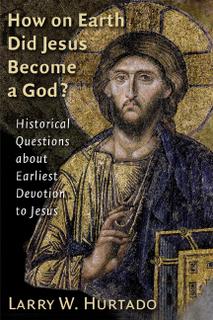 In his forthcoming book on early Christian Devotion, How on Earth Did Jesus Become a God? Larry Hurtado investigates the keen devotion to Jesus that emerged with surprising speed after his death. Reverence for Jesus among early Christians, notes Hurtado, included both grand claims about Jesus' significance and a pattern of devotional practices that effectively treated him as divine. Directed at readers across religious lines, this book argues that whatever one makes of such devotion to Jesus, the subject at least deserves serious historical consideration. Mapping out the lively current debate about Jesus for interested newcomers, Hurtado explains the evidence, issues, and positions at stake. His clear and learned treatment of such matters as persecution of Jesus worshipers and Christianity's development out of Judaism will also catch the interest of students and specialists.
In his forthcoming book on early Christian Devotion, How on Earth Did Jesus Become a God? Larry Hurtado investigates the keen devotion to Jesus that emerged with surprising speed after his death. Reverence for Jesus among early Christians, notes Hurtado, included both grand claims about Jesus' significance and a pattern of devotional practices that effectively treated him as divine. Directed at readers across religious lines, this book argues that whatever one makes of such devotion to Jesus, the subject at least deserves serious historical consideration. Mapping out the lively current debate about Jesus for interested newcomers, Hurtado explains the evidence, issues, and positions at stake. His clear and learned treatment of such matters as persecution of Jesus worshipers and Christianity's development out of Judaism will also catch the interest of students and specialists.
The book has a useful chapter: To Live and Die for Jesus: Social and Political Consequences of Devotion to Jesus in Earliest Christianity. The chapter outlines several interesting features on early Christian practices and how these would have been perceived by the various social and political structures of the day. These include, Family Relations, Christians married to non-Christians, and Christian Slaves. What I found most interesting in this chapter, was his section on Family Relations. The following reflections are based on that chapter, which Dr. Hurtado was kind enough to let me read. However, one should not assume that all my conclusions or comments are necessarily his.
Although Hurtado does not argue that these stem from the historical Jesus, but just notes that they come from the Jesus-Tradition, I think a strong argument can be made for the authenticity of many sayings referring to the family and allegiance to Jesus. The first two sayings on family come from the supposed Quelle document, the hypothetical source for Matthew and Luke. Without detailing arguments here, I feel this refers to oral tradition and there are ways around the synoptic problem that do not require the "Q" hypothesis [which in my mind has become overly complex and unnecessary]. The Lukan parallel of our Matthean axiom has Semitic traces.[1]
Matt 10:34-39 “Do not think that I have come to bring peace to the earth; I have not come to bring peace, but a sword. For I have come to set a man against his father, and a daughter against her mother, and a daughter-in-law against her mother-in-law; and one’s foes will be members of one’s own household. Whoever adores father or mother more than me is not worthy of me; and whoever adores son or daughter more than me is not worthy of me; and whoever does not take up the cross and follow me is not worthy of me. Those who find their life will lose it, and those who lose their life for my sake will find it.
Luke 12:51-53 Do you think that I have come to bring peace to the earth? No, I tell you, but rather division! From now on five in one household will be divided, three against two and two against three; they will be divided: father against son and son against father, mother against daughter and daughter against mother, mother-in-law against her daughter-in-law and daughter-in-law against mother-in-law.”
Luke 14:25-27 Now large crowds were traveling with him; and he turned and said to them, “Whoever comes to me and does not hate father and mother, wife and children, brothers and sisters, yes, and even life itself, cannot be my disciple.
Jesus’ call to become a disciple involved an exclusivist socio-political and religious claim upon those who chose to embrace him as their king. One should not think [cf. Matt 5:17] that Jesus’ mission brings peace rather than a sword. However, one should also not imagine that this means that Jesus has the intention of a violent agenda. Jesus goes on to explain what he intends by contrasting peace and the sword. Jesus does not appear to be ignorant that his call to “repent and believe for the reign of YHWH is dawning” will incite a war of allegiances.
But Jesus is quick to highlight exactly how his team must work out and remain faithful to his agenda within this dawning battle of loyalties. In a societal milieu of traditional values and familial commitments Jesus’ mission and message will divide and separate those wanting to be faithful to him, and those wanting to hold onto several time honoured traditions. It will affect every sort of relationship, whether by blood or marriage. It will also affect various authority structures set within the household as Jesus claims superiority in all relationships. This will, inevitably cause both trouble and division.[2] Jesus’ followers are warned that they may have to choose between their commitment to him and their own family (Matt. 10:37-39; Luke 14:26-27). The reason is clear: the royal proclamation of the reign of YHWH and the summons to embrace and entrust Jesus as the king, cannot be adequately understood apart from careful attention being paid to the “extended household” (Gk oikos; Lat familia). In households, the pater familias [father] was the head of the household who held the authority and position of honour.[3] This is whole structure is being directly challenged by Jesus. Loyalty to Jesus must take precedence over any other familial relationship.
The reason being is clearly stated by Jesus, and he is unashamed to note this. Jesus as their true king must be worthy of more affection, adoration and allegiance than anyone or anything else. The christological implications of this claim now come to the fore as one considers the notion of idolatry and Torah. Torah has clearly laid out that one should honour familial relationships, especially the patriarchal head of the house. But Jesus’ kingdom announcement calls for a loyalty that transcends such boundaries. We would not have to incorporate much more data to substantiate the further claim that Jesus, in proclaiming the kingdom of God, was claiming to be YHWH’s anointed Messiah/King. And this is not difficult to imagine. Jesus certainly claimed more allegiance than just a prophet. The allegiance that Jesus claimed went beyond the prescriptions of Torah and thus alert us to the unparalleled authority claimed by Jesus.
For Gentiles a proper conversion to Jesus would have to involve a radical disassociation from their previous, traditional religious groups and practices. One cannot but suggest this as a plausible account of Jesus’ petition to follow him in his counter-empire mission of bringing the reign of YHWH into play.
In commenting on the Lukan pericope, Joel Green notes generally that:
As his present discourse, begun in 12:1, has already made clear, a decision to adopt his canons of faithfulness to God would require a deeply rooted and pervasive transformation of how one understands God and how one understands the transformation of the world purposed by this God. This would involved Jesus’ disciples in dispositions and forms of behaviour that could only be regarded as deviant within their kin groups. Earlier Jesus had been concerned to prepare his disciples for the persecution before the authorities that would result from identification with his mission (vv. 1-12); now he maintains that his ministry has as one of its consequences the deconstruction of convention family bonds.[4]
In our Matthean version Jesus specifically states that the issue is worship, i.e. who is worthy of more affection, adoration and allegiance. The division is ultimately about worth-ship. Who is worthy of this kind of allegiance and adoration? What is so significant about Jesus that loyalty to him should transcend traditional kinship groups? Why should they allow Jesus to invade their family structures with his announcement of the reign of YHWH? Who does Jesus think he is that he can claim this kind of loyalty, that should possibly only be given to YHWH or even the emperor?[5]
Jesus was inciting allegiance to in a society gone astray. Gone away into exile…
And then we have mention of the
call to the cross. Again, the issue of worth-ship is at the fore here. If one does not follow Jesus’ command and call, one is simply not worthy. One has not considered the weight of the matter at hand, and who exactly is issuing this call. We must remind ourselves that the cross is the
greatest symbol of foreign oppression and dictatorship. It categorically states that this is what happens to those who do not pledge allegiance to Rome and her emperor. But if Jesus’ challenge applies to family units, does it apply to the greater Roman family where the emperor is the great Father of the nation? The one who provides PAX and prosperity? Is there again, a subversive challenge to the greater familial loyalty of local inhabitants to the Emperor?
[1] See Witherington, The Christology of Jesus, pg. 121
[2] According to Davies and Allison, Matthew, II pg. 217 n.22 “When Jesus and his messengers are not received, there cannot but be conflict.”
[3] One must remember that the father exercised total legal control (potestas) over both his family and the enslaved members of his household. According to Roman law, this potestas even included the power over life and death.
[4] Green, The Gospel of Luke, pg. 509
[5] Or as Green, The Gospel of Luke, pg. 509 asks: “How could a ministry the effects of which include the dissolution of family ties be sanctioned by God?”




